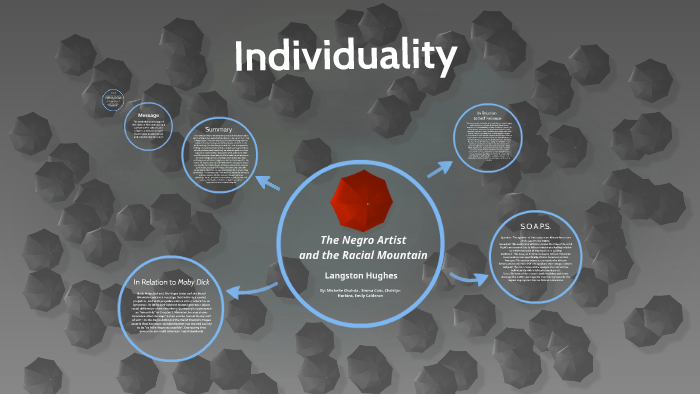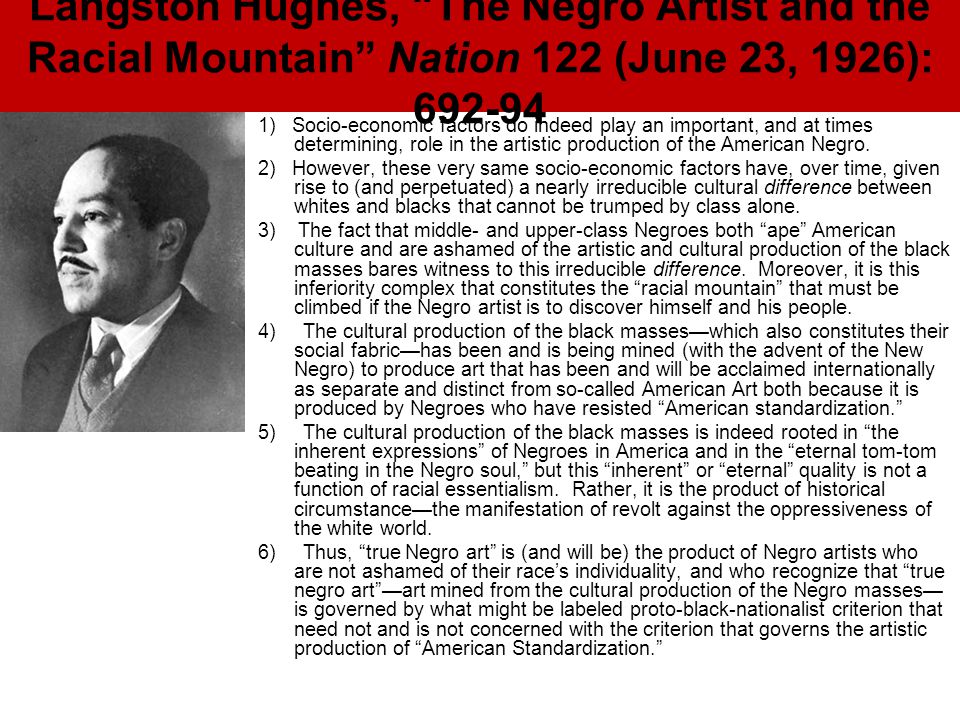In this poem Hughes speaks for equality and freedom for the Negro just as he does in The Negro Artist and the Racial Mountains. 5 1384 words The Study of a Negro Policeman Pages.

A Literary Analysis Of The Essay The Negro Artist And The Racial Mountain By Langston Hughes Literary Analysis Essay Racial
He emphasizes the ability of Negros to accept their selves and expose their roots.

. GradeSaver The Negro Artist and the Racial Mountain Literary Elements. Hughes interprets this statement as the unnamed poets latent desire to be a white poet and by extension a white person. 7 1950 words The Negro Evolves Pages.
The juxtaposed narratives provide the foundation upon which Hughess larger argument can stand. The Negro Artist and the Racial Mountain. He was educated at Columbia University and Lincoln University.
Here Hughes personifies abstract elements of culture to communicate the vitality and strength inherent to Black identity. In this essay Hughes scolds artists who shy away from their racial identity to satisfy fearful Negros and white audiences. He does not want any Negros falling into the white community and does not want Negro brothers to change for the white.
Equality In his famous essay The Negro Artist and the Racial Mountain Langston Hughes writes. In 1926 langston hughes wrote an essay the negro artist and the racial mountain. According to Hughes this was the mountain standing in the way of any true Negro art in America-this urge within the race towards whiteness the desire to pour racial individuality into the mold of American standardization and to be a.
Langston Hughes The Negro Artist and the Racial Mountain claimed that African Americans face racial and cultural challenges with finding their own identity in a society mainly influenced by Eurocentric American culture. The Negro Artist and the Racial Mountain Essay. This article was written in 1926.
This was because white people looked down on them during. 5 1246 words The Negro Speaks of Rivers Pages. The House Negro and the Field Negro Pages.
The Negro Artist and the Racial Mountain 1926 The article The Negro Artist and the Racial Mountain by Hughes 1926 the author shows a situation that the African Americans felt underestimated for being black and attempted to embrace whites culture. Immediately following these descriptions Hughes introduces his vision of the American Negro artist who can escape the restrictions Paragraph 5 and describes some of the nuances he expects this artist is able to find. All the places that Hughes moved to comprised of a small community of blacks who he was always attached to.
Langston Hughes was a leader of the Harlem Renaissance of the 1920s. Langston hughes discusses his belief that black poets should not be ashamed of themselves as black people or strive to be white in any way in. In some respects Langston Hughes had become known for being a great Black-American poet.
Check this Literary Analysis of The Negro Artist the Racial Mountain to learn more about the essay written by Langston Hughes. In his essay entitled The Negro Artist and the Racial Mountain he directly speaks to the Negros. A Prominent Negro clubwoman in Philadelphia paid eleven dollars to hear Raquel Meller sing Andalusian popular songs.
In 1926 hughes wrote the critically acclaimed essay the negro artist and the racial mountain for the nation magazine. The Negro Artist and the Racial Mountain. Hughess message to white audiences recognizes their interest in black art for means of.
Hughess piece The Negro Artist and the Racial Mountain 1926 which rejects artistic systematic and societal conventions and promotes the beauty of blackness and the importance of existing as an artist within the scope of being black was published not only as a response to George Schuylers dismissal of the need for black art and the existence of the need to express. The Negro poet suggested that he liked to be a white writer meaning that he desired to be a white man Hughes Para. But she stated a few weeks before she would not think of going to hear that woman Clara Smith a great black artist sing Negro folk songs.
In the essay The Negro Artist and the Racial Mountain and the poem Mother to Son written by Langston Hughes both have a common image of climbing to represent that the African Americans had to struggle to find their place in American society during the 1920s. 873 Words 4 Pages. And many in upperclass Negro church even.
GradeSaver 22 April 2022. 7 1852 words A Comparative Analysis Of Langston Hughess The Negro Speaks Of Rivers And Sandra Cisneross House On Mango Street Pages. One of the most promising of the young Negro poets said to me once I want to be a poet--not a Negro poet meaning I believe I want to write like a white poet.
This essay begins with an anecdote. He starts off with the phrase an artist expressed I want to be a poet not a Negro poet He takes this statement and explains more of why the artist spoke these words. Langston Hughes famous essay The Negro Artist and the Racial Mountain is an article over racial walls in an artists life.
Langston Hughes was born in Joplin Missouri in 1902. The Negro Artist and the Racial Mountain written by Langston Hughes is a famous essay that was in The Nation Magazine in 1926. A prominent Negro clubwoman in Philadelphia paid eleven dollars to hear Raquel Meller sing Andalusian.
While a student at Lincoln he published his first book of poetry The Weary Blues 1926 as well as his landmark essay seen by many as a cornerstone document articulation of the Harlem renaissance The Negro Artist and the Racial. But let us look again at the mountain. Meaning subconsciously I would like to be a white poet.
Analysis Of The Negro Artist And The Racial Mountain By Langston Hughes. In Langston Hughess The Negro Artist and the Racial Mountain the writer presents his argument regarding the creative limitations Black Americans face. Initially published in 1926 the essay traces a short powerful argument that relies both on Hughess own identity as an.
To these the Negro artist can give his racial individuality his heritage of rhythm and warmth and his incongruous humor that so often as in the Blues becomes ironic laughter mixed with tears. As a result aside from the primary reason of having a significant message his work on The Negro Artist and the Racial Mountain became a more interesting read because of his writing style. The poem I Too is proof that no Negro should be ashamed of his race or the products of his race to please white AmericaLangston Hughess poem Freedom was originally entitled Democracy.
He writes cause the smug Negro. The Negro Artist and the Racial Mountain Summary. More specifically Hughes discussed the challenges of African American artists in embracing their.
We build our temples for tomorrow strong as we know how and we stand on top of the mountain free within ourselves Hughes. He then grew up in Lawrence Kansas and Lincoln Illinois and later went to high school in Cleveland Ohio. In 1926 Hughes wrote the critically acclaimed essay The Negro Artist and the Racial Mountain for The Nation magazine.
A Literary Analysis of the Essay the Negro Artist and the Racial Mountain by Langston Hughes Works. The opening line of Langston Hughes short essay The Negro Artist and the Racial Mountain is by far the most the most painful line Hughes used. One of the most promising of the young Negro poets said to me once I want to be a poetnot a Negro poet 1.

Doc Climbing Uphill The Dismantling Of Racial Individuality In Langston Hughes The Negro Artist And The Racial Mountain Whitney Nelson Academia Edu

The Negro Artist And The Racial Mountain By

The Negro Artist And The Racial Mountain Free Essay Example

Revisiting The Racial Mountain Pen America

Mulatto A Play Of The Deep South 1930 By Langston Hughes Ppt Video Online Download

Fine Clothes To The Jew By Langston Hughes I Ii And Iii Of Iii Ppt Download

The Negro Artist And The Racial Mountain Docx The Negro Artist And The Racial Mountain By Langston Hughes Part A Historical Context Harlem Course Hero
0 comments
Post a Comment